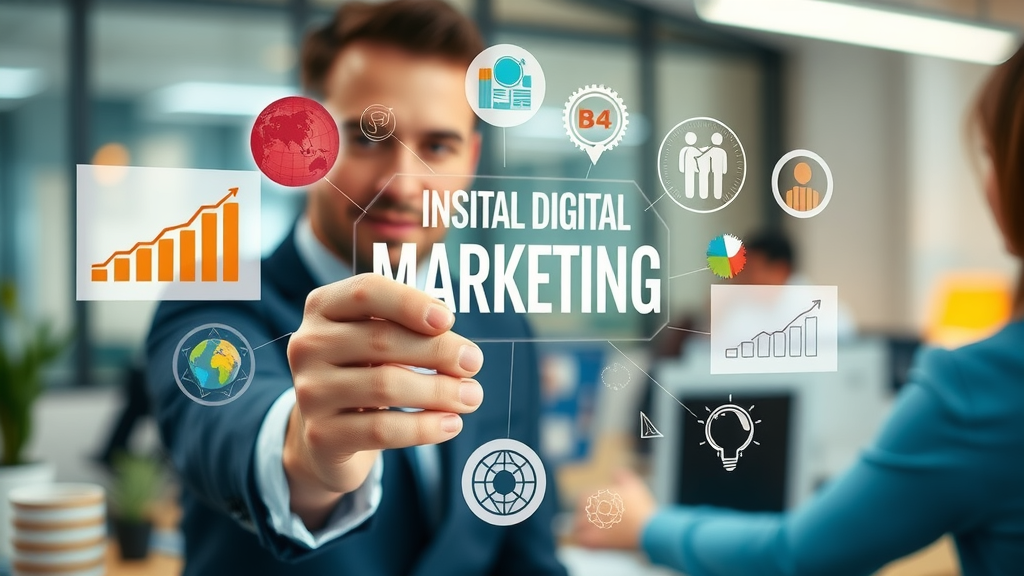As we stand on the cusp of an era defined by digital evolutions, the question at the forefront of everyone’s mind is: What is the future of digital marketing? With a predicted investment surpassing billions in the next few years, understanding these changes is paramount. This article offers an educational dive into what lies ahead for digital marketing professionals.
The Evolution of the Digital Market: A Statistical Overview
The digital marketing landscape has transformed exponentially, driven by technological advancements and shifts in consumer behavior. In 2020 alone, digital ad spend exceeded traditional media, marking a paradigm shift in marketing strategies. Platforms like social media and search engines have become indispensable tools for engaging with the target audience.
The digital market's fast-paced nature requires businesses to stay competitive by integrating the latest technologies and consumer insights. Digital marketers today leverage machine learning to optimize campaigns and tailor personalized experiences for users, ensuring their presence in a crowded marketplace.

Understanding the Digital Market Transformation
The digital marketing transformation is characterized by an increased reliance on data analytics and AI tools to drive decisions. Marketers are no longer guessing consumer preferences; intelligent algorithms provide actionable insights into consumer behavior. This evolution requires adapting to digital channels that customers frequent, ensuring messages resonate at every touchpoint.
How Digital Marketing Has Changed Over the Years
Over the past decade, digital marketing has shifted from basic online ads to immersive experiences that engage users. From content marketing through blogs and videos to real-time interactions on social media, marketers have embraced multichannel approaches. Platforms like Facebook and Instagram aren't just for social interaction anymore; they are critical for influencer marketing strategies and audience engagement.
Exploring Digital Marketing Trends for the Future
Digital marketing trends are continually evolving to meet the changing demands of consumers and technological advances. As we look to the future, staying ahead means adapting to these shifts with agility and foresight.
Key Marketing Trends Shaping the Future
The future promises several marketing trends that will revolutionize how businesses connect with audiences. The integration of artificial intelligence in analyzing consumer data will become standard practice, enabling precise targeting and enhancing the customer journey. Additionally, voice search optimization will gain traction as smart speakers like Google Home become household staples.

Integrating New Digital Channels
Emerging digital channels present exciting opportunities for marketers to diversify their outreach. Streaming services, podcast sponsorships, and interactive digital experiences are changing how brands communicate with potential customers. These channels offer platforms to deliver stay competitive messaging in ways that resonate deeply with diverse audiences.
The Rise of Generated Content and Automation
Automation in digital marketing is no longer optional; it's essential for scaling efforts and freeing creative professionals to innovate. Generated content through AI tools enhances content creation by dynamically adapting to market trends and consumer demands. Automation streamlines processes, allowing marketers to focus on strategic growth.
Harnessing Artificial Intelligence in Digital Marketing
Artificial intelligence is reshaping how marketers approach business strategies. It provides insights that help refine search optimization to meet user intent and improve customer experiences.
Artificial Intelligence and Search Engine Optimization
AI-driven SEO processes have become crucial for digital marketers aiming to optimize their presence on major search engines. Intelligent algorithms have the capacity to analyze vast amounts of data, deducing patterns that enhance search engine rankings and visibility. AI tools help businesses move beyond keyword density, focusing instead on user experience and content relevance.

AI's Role in Interpreting Consumer Behavior
As digital platforms increasingly emphasize personalized experience, AI's ability to interpret consumer behavior becomes invaluable. It predicts buyer personas and tailors marketing strategies that align closely with individual preferences. Understanding these patterns aids in creating impactful marketing campaigns that connect effectively with the target audience.
The Impact of Social Media on the Digital Marketing Landscape
Social media platforms wield immense influence over digital marketing strategies. Their dynamic nature requires continuous adaptation and strategic engagement.
The Continued Rise of Influencer Marketing
Influencer marketing has proven to be a powerful tool for connecting with audiences on a personal level. Influencers have the unique ability to foster trust and authenticity, bridging the gap between brands and consumers. Their engagement strategies on social media platforms elevate brand visibility and boost consumer trust.

Crafting Effective Content Marketing Strategies
Effective content marketing strategies are built on a foundation of storytelling and value delivery. By understanding consumer needs, digital marketers create content that educates, entertains, and inspires action. This approach not only enhances brand awareness but also drives conversions and fosters long-term loyalty.
Does Digital Marketing Have a Future?
The future of digital marketing is bright, driven by innovative technologies and evolving consumer preferences. Adapting to these changes ensures sustained growth and success.
Exploring the Sustainability of Digital Marketing
Sustainable marketing practices underscore the need for eco-friendly approaches that contribute positively to society. By leveraging green technology, businesses can attract eco-conscious consumers and enhance their brand image. This focus on sustainability aligns brands with current societal values, ensuring long-term relevance.

Preparing for the Future: Upcoming Challenges
While the future of digital marketing is promising, it comes with its share of challenges. Staying abreast of technological advancements, regulatory changes, and evolving consumer expectations is crucial for maintaining a competitive edge. Digital marketers need to be proactive in navigating these challenges, ensuring their strategies are adaptable and forward-focused.
Where Will Digital Marketing Be in 10 Years?
Looking a decade ahead, digital marketing is poised for transformative shifts that will redefine engagement strategies and consumer interactions.
Predicted Developments Over the Next Decade
As technology continues its rapid evolution, we can expect a surge in the adoption of advanced immersive experiences such as augmented reality and virtual reality. These tools will revolutionize brand storytelling, offering consumers unprecedented interactive experiences. AI and machine learning will further enhance the precision of marketing efforts, making hyper-targeted campaigns the norm.
What Is the Future of Digital Marketing in 2025?
The year 2025 will likely see digital marketing embracing cutting-edge technologies and innovative practices that reshape how brands communicate with consumers.
Strategic Forecasts for the Next Few Years
The proliferation of connected devices and the Internet of Things will offer new data collection and analysis opportunities, informing smarter marketing strategies. Businesses will leverage these insights to create cohesive, personalized experiences that resonate with their audiences and foster lasting relationships.
What Is the Next Big Thing in Digital Marketing?
The digital marketing realm is continually evolving, with each year unveiling new technologies and practices poised to become game-changers.
Innovative Technologies on the Horizon
Emerging digital marketing technologies are set to redefine the marketing landscape. Advancements in natural language processing and AI will enable brands to communicate more naturally with consumers, offering conversational interactions and seamless experiences.

Potential Game-Changers for the Marketing World
Groundbreaking technologies like blockchain for data security and transparent transactions are expected to be major disruptors. As consumers become increasingly concerned about data privacy, these innovations will help build trust and authenticity, positioning brands as leaders in the ethical use of data.
What You'll Learn in This Article
- In-depth understanding of how digital marketing is evolving
- Insight into the role of AI and machine learning
- Strategies to incorporate future trends into your marketing
| Year | Trend | Impact |
|---|---|---|
| 2025 | AI and Machine Learning | Enhanced personalization and targeting |
| 2028 | Augmented Reality | Immersive consumer experiences |
| 2030 | Blockchain | Improved data security and trust |
"Digital marketing can't be slowed down, and those who ride the digital wave today will be the market leaders of tomorrow." - Industry Expert
FAQs
Does digital marketing have a future? Yes, digital marketing is continuously evolving and adapting to new technologies and consumer behaviors, ensuring its relevance and growth prospects.
Where will digital marketing be in 10 years? In 10 years, digital marketing will be highly influenced by immersive technologies, AI, and personalized consumer experiences, shaping innovative marketing strategies.
What is the future of digital marketing in 2025? By 2025, digital marketing will emphasize advanced AI tools, personalized consumer interactions, and strategic use of multi-channel platforms for comprehensive engagement.
What is the next big thing in digital marketing? The next big innovation in digital marketing is expected to be the combination of blockchain technology for secure transactions and advanced analytics for data-driven insights.
Concluding Thoughts on the Future of Digital Marketing
Key Takeaways and Strategic Recommendations

To thrive in the future of digital marketing:
- Embrace emerging technologies and integrate them into your strategies.
- Leverage AI for data-driven decision-making and personalized experiences.
- Focus on creating genuine connections with your audience through strategic content marketing.
Embrace Change: Prepare for the Digital Future
As the digital marketing landscape evolves, embracing change and leveraging new technologies will be imperative. Equip your marketing teams with the tools and knowledge to stay ahead of trends, ensuring your brand remains a formidable force in the fast-changing marketing world.
 Add Row
Add Row  Add
Add 




Write A Comment